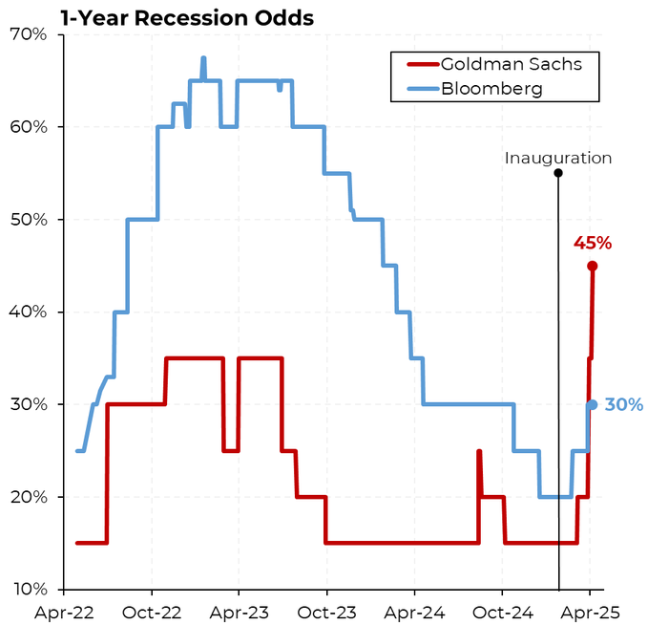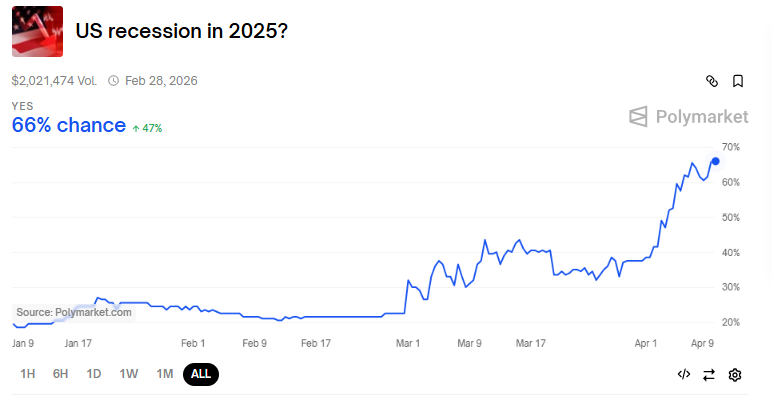Goldman Sachs has raised the probability of a U.S. recession within the next year to 45%. This prediction indicates increasing economic uncertainty amid heightened global tensions, worsening financial conditions, and anticipated tariff impacts.
This is the highest recession probability predicted by the investment bank since the start of inflation and interest rate hikes after the pandemic.
Goldman Sachs, U.S. Recession Probability at 45%
Goldman Sachs' latest report "Recession Countdown" explains the sharp deterioration of economic conditions. This includes the impact of tariffs expected to take effect on April 9.
Steven Rattner, former head of the Obama Auto Task Force and current Wall Street financier, shared this news on social media, emphasizing the significance of Goldman's new outlook.
"Goldman now sees a 45% chance of recession in the next year." – Steven Rattner wrote.

According to Rattner, recent policy uncertainty and capital expenditure concerns are exacerbating financial market instability.
Meanwhile, Nick Timiraos, chief economics correspondent for the Wall Street Journal, reported that the bank adjusted its Q4 2025 GDP growth forecast to 0.5%.
"We are lowering our Q4 2025 GDP growth forecast to 0.5% and raising the 12-month recession probability from 35% to 45%, as rapid financial condition tightening, foreign consumer boycotts, and continued policy uncertainty surge suggest capital expenditure could decline more than expected." – Nick Timiraos reported, citing Goldman Sachs.
This reflects the anticipated ripple effects, but the bank's current prediction assumes that the new tariffs scheduled for April 9 will not materialize.
However, Goldman Sachs stated that if Trump implements these tariffs, they will adjust their predictions and officially forecast a recession. This could further stoke already simmering inflation and apply additional downward pressure on U.S. economic growth.
Amid escalating trade tensions, Polymarket bettors see the U.S. recession probability at nearly 70% after the tariff implementation day.

Goldman Sachs, Increasing Bitcoin ETF Holdings
Despite the gloomy economic outlook, Goldman Sachs is heavily investing in the cryptocurrency sector, particularly Bitcoin (BTC). As of February 12, the bank holds $1.5 billion in Bitcoin. This exposure is through BlackRock and Fidelity's Bitcoin ETFs.
Additionally, recent filings show that Goldman Sachs has significantly increased its Bitcoin ETF holdings. Compared to previous filings, they increased holdings by 88% in iShares Bitcoin Trust (IBIT) and 105% in Franklin Bitcoin Trust (FBTC).
These positions reflect Goldman Sachs' growing interest in digital assets amid traditional market instability.
This increase comes at a time when Bitcoin has shown resilience, outperforming other asset classes in recent months. The bank's CEO David Solomon recently emphasized blockchain technology's potential to streamline traditional finance (TradFi). BeInCrypto reported that Solomon said Bitcoin does not threaten the U.S. dollar.
Besides Goldman Sachs, JPMorgan has also predicted a U.S. recession. BeInCrypto reported that they were the first major Wall Street bank to predict a recession after Trump's tariffs.
Their prediction warns of the broad economic consequences of a trade war and suggests the Federal Reserve might need to cut rates sooner than expected.
The potential rate cuts, seen by many as a response to a weakened economy, add concerns about stagflation, where inflation rises simultaneously with economic stagnation.
This economic uncertainty increases the likelihood of quantitative easing (QE) in the U.S. financial system. These outcomes could have broad implications for the cryptocurrency market.
If the Fed chooses stealth QE, it could inject liquidity into the market and provide a short-term lifeline to risk assets like Bitcoin.
However, such measures could intensify inflationary pressures, demanding a delicate balance from policymakers.






